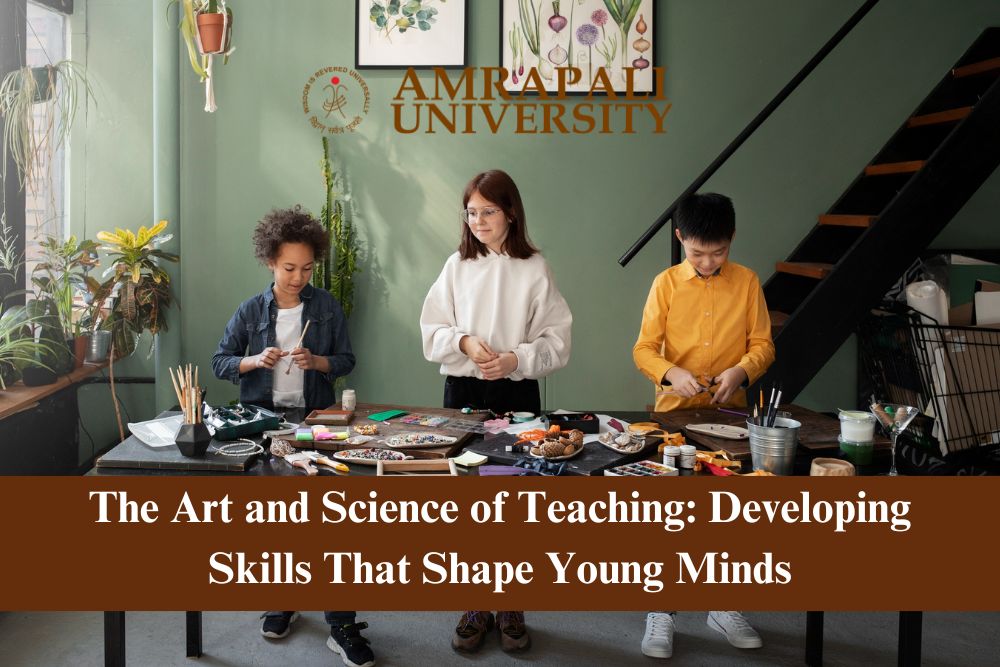Introduction:
Teaching is more than just a profession—it’s both an art and a science that shapes the foundation of society. At Amrapali University, the B.ed Colleges in Uttarakhand where the art lies in inspiring young minds, while the science lies in mastering pedagogical techniques that foster learning and growth. In today’s evolving educational landscape, effective teachers are not just knowledge providers but also mentors, innovators, and lifelong learners.
Aspiring educators who wish to make a lasting difference understand that the right training environment plays a crucial role in shaping their future. That’s why choosing from the colleges for B.Ed has become essential for those looking to combine academic knowledge with real-world teaching experience. These institutions provide a perfect blend of creativity, research, and skill-based training that equips future teachers to influence the next generation effectively.
About Us:
We believe an educator’s impact transcends textbooks—so our teacher-training environment focuses on both art and science: creativity and evidence-based pedagogy. Through simulated classrooms, practical teaching labs, and school-internship linkages, students engage in real teaching experiences. Beyond pedagogy, our Literary Society, Theatre and Drama Club, and Education Technology Workshops help future teachers hone their communication, empathy and digital literacy. Annual events such as “Teaching Innovation Week” and inclusive festivals bring future educators together for collaborative practice and reflection. Sports and yoga clubs ensure the holistic development of each trainee. We are committed to building educators who inspire and adapt—teachers who shape young minds not only with methodology, but with heart, integrity and modern skills ready for the rapidly changing world of schooling.
1. Understanding the Dual Nature of Teaching: The Art and the Science
At its core, teaching blends human connection with systematic instruction.
- The art of teaching involves emotional intelligence, empathy, communication, and the ability to connect with students. Great teachers can inspire curiosity and build confidence in learners.
- The science of teaching involves understanding learning theories, educational psychology, assessment strategies, and curriculum design. It’s grounded in evidence-based practices that ensure effective knowledge transfer.
Successful educators learn to balance both sides — combining creativity with structure, and passion with precision. Modern B.Ed programs are carefully designed to develop this balance through a mix of classroom learning, technology integration, and practical training.
-
Why B.Ed Programs Are More Important Than Ever
Education today is no longer limited to textbooks. Teachers must be tech-savvy, emotionally aware, and globally informed. A well-structured Bachelor of Education (B.Ed) program ensures that aspiring teachers gain these multidimensional capabilities.
A comprehensive B.Ed course helps develop:
- Pedagogical expertise – Mastering diverse teaching methodologies for all learning styles.
- Critical thinking – Encouraging inquiry-based and problem-solving approaches in the classroom.
- Adaptability – Preparing teachers to navigate online, hybrid, and traditional classroom settings.
- Ethical values – Promoting integrity, empathy, and responsibility toward students and society.
The B.Ed colleges emphasize these components through a dynamic curriculum that bridges theory and practice. They prepare teachers not just for classrooms but for a rapidly changing educational ecosystem.
-
Skill Development: Building the Foundation of Great Teachers
Effective teaching relies heavily on skill development. While theoretical knowledge lays the foundation, practical exposure transforms learners into educators.
Core Skills Cultivated During a B.Ed Program:
- Communication and Presentation Skills – Teachers must articulate concepts clearly and engage students effectively.
- Classroom Management – Maintaining discipline while encouraging creativity and participation.
- Lesson Planning and Assessment – Designing meaningful learning experiences and evaluating outcomes effectively.
- Emotional Intelligence – Understanding student behavior and addressing learning challenges empathetically.
- Technological Proficiency – Using digital platforms, smart tools, and e-learning resources for modern teaching.
The B.Ed colleges understand that educators must be both facilitators and innovators. Hence, they integrate these skills into regular coursework, workshops, and school internships.
-
Integrating Modern Pedagogies and Educational Technologies
Education in the 21st century is defined by digital innovation. From virtual classrooms to interactive simulations, technology has revolutionized the way teachers deliver lessons and students engage with learning materials.
Top B.Ed institutions focus on blending pedagogical science with technological literacy. Aspiring teachers learn to:
- Use Learning Management Systems (LMS) for structured teaching.
- Incorporate multimedia presentations to simplify complex concepts.
- Design inclusive lesson plans that cater to diverse learning needs.
- Utilize online assessments and data analytics to track student progress.
This integration of technology ensures that graduates are not just qualified educators but future-ready professionals capable of thriving in global education systems.
-
The Role of Practical Exposure and School Internships
Teaching cannot be mastered in isolation—it’s honed through experience. That’s why practical exposure is a vital component of every B.Ed curriculum.
Internships in schools allow trainees to:
- Observe experienced educators in real classrooms.
- Apply teaching strategies in live settings.
- Develop confidence in lesson delivery and classroom management.
- Receive mentorship and constructive feedback for continuous improvement.
The B.Ed colleges have partnered with reputed schools and educational boards, ensuring that every student-teacher experiences real classroom challenges before entering the workforce. These collaborations bridge the gap between theory and practice, preparing future educators to lead with confidence and compassion.
-
Research and Innovation in Education
Teaching is a dynamic field that evolves with time, influenced by psychology, sociology, and technology. Hence, research becomes a key component in shaping effective educators.
In leading B.Ed programs, students engage in action research — exploring real classroom issues, experimenting with teaching strategies, and analyzing results. This process helps teachers develop critical thinking and reflective practices that enhance their professional growth.
The B.Ed colleges encourage students to participate in educational research, seminars, and conferences. Such exposure enables them to understand global education trends and adopt innovative teaching practices.
-
Personality Development: The Heart of Effective Teaching
Teachers not only impart knowledge—they embody values, attitudes, and behaviors that influence young learners. Hence, personal development is as vital as professional training.
B.Ed programs include sessions on:
- Leadership and teamwork
- Public speaking and confidence building
- Emotional well-being and mindfulness
- Creative thinking and adaptability
Through co-curricular activities, theatre, and community projects, trainee teachers build empathy, resilience, and leadership—qualities that make them role models for future generations.
-
Embracing Diversity and Inclusion in Education
In today’s classrooms, diversity is the norm. Students come from various linguistic, cultural, and social backgrounds. Teachers must therefore cultivate inclusive practices that celebrate differences and ensure equal learning opportunities for all.
Modern B.Ed programs train educators to:
- Adapt teaching methods for children with special needs.
- Use inclusive language and materials.
- Foster a culture of respect and belonging in classrooms.
The B.Ed colleges emphasize inclusive education as a core value, preparing teachers to handle diverse learners with sensitivity and care.
-
Global Perspectives in Teacher Education
As education becomes increasingly globalized, teachers must be prepared to interact with international learning standards and cultural contexts. B.Ed programs today expose students to global education practices through:
- Exchange programs and international collaborations.
- Workshops on cross-cultural communication.
- Case studies from global classrooms.
Such exposure transforms aspiring educators into global teaching professionals who can inspire learners anywhere in the world. The B.Ed colleges play a vital role in this transformation by offering international academic linkages and updated global curricula.
-
Career Opportunities After a B.Ed Degree
A B.Ed degree opens doors to diverse career paths beyond traditional teaching. Graduates can explore roles such as:
- School Teachers (Primary, Secondary, or Senior Secondary)
- Academic Coordinators and Curriculum Designers
- Educational Counselors
- Content Developers for EdTech Companies
- Researchers and Policy Analysts in Education
- Trainers in NGOs or Skill Development Programs
The demand for trained educators is consistently rising, especially with the government’s focus on National Education Policy (NEP) 2020, which emphasizes holistic and competency-based education. Graduates from the B.Ed colleges find themselves well-prepared to seize these opportunities both nationally and internationally.
-
Why Choosing the Right B.Ed College Matters
Selecting the right institution shapes your teaching philosophy and future success. The most reputed B.Ed colleges offer:
- Well-structured curricula aligned with national education standards.
- Faculty members with a balance of academic excellence and practical experience.
- Exposure to research, innovation, and community engagement.
- State-of-the-art learning infrastructure including digital classrooms and teaching labs.
By choosing an institution that values both academic rigor and human connection, aspiring teachers lay the foundation for a meaningful and impactful career in education.
-
The Future of Teaching: Continuous Learning and Evolution
The journey of a teacher never truly ends. As technology, society, and student needs evolve, educators must continue to learn, unlearn, and relearn. Lifelong learning is not just a principle but a necessity in this profession.
The next generation of teachers will be facilitators of personalized learning, designers of digital learning experiences, and mentors for holistic growth. The B.Ed colleges are already preparing their students for this future by embedding continuous professional development into their curriculum.
Conclusion:
The art and science of teaching go hand in hand in creating educators who can nurture the minds that will build tomorrow’s world. At Amrapali University, the Top B.ed Colleges in Uttarakhand where a strong foundation in pedagogy, coupled with empathy, innovation, and adaptability, defines a truly great teacher.
Those who pursue their B.Ed degree from the B.Ed colleges gain not only academic knowledge but also the wisdom and experience to make a lasting impact. These institutions don’t just train teachers—they inspire changemakers, thought leaders, and nation builders.
Ultimately, the journey of learning how to teach is also a journey of self-discovery. As future educators master the art and science of teaching, they prepare themselves to shape generations of curious, compassionate, and capable learners—one classroom at a time.
FAQs:
Q. 1 What does the phrase “art and science of teaching” mean?
Ans : It refers to the combination of creative teaching approaches (the art) and research-backed pedagogy (the science) that together build effective, inspiring educators who can shape young learners’ futures.
Q. 2 Why is teacher training important in today’s education landscape?
Ans : Modern classrooms require teachers who understand psychology, technology integration, and adaptive learning methods to meet diverse student needs effectively.
Q. 3 How do B.Ed programs prepare teachers for modern classrooms?
Ans : Comprehensive B.Ed programs balance theoretical learning with classroom practice, emphasizing lesson planning, student engagement, and inclusive education.
Q. 4 What skills are developed through a professional teacher education course?
Ans : Aspiring educators learn communication, empathy, classroom management, curriculum design, and innovative assessment techniques that enhance the learning experience.
Q. 5 How can students ensure they choose a quality B.Ed institution?
Ans : Students should explore the best colleges for B.Ed that emphasize both pedagogy and hands-on teaching internships, preparing them for real-world school environments.
Q. 6 How does technology enhance teaching effectiveness?
Ans : Digital tools, smart classrooms, and interactive platforms allow teachers to create dynamic, engaging, and personalized learning experiences that improve student outcomes.



